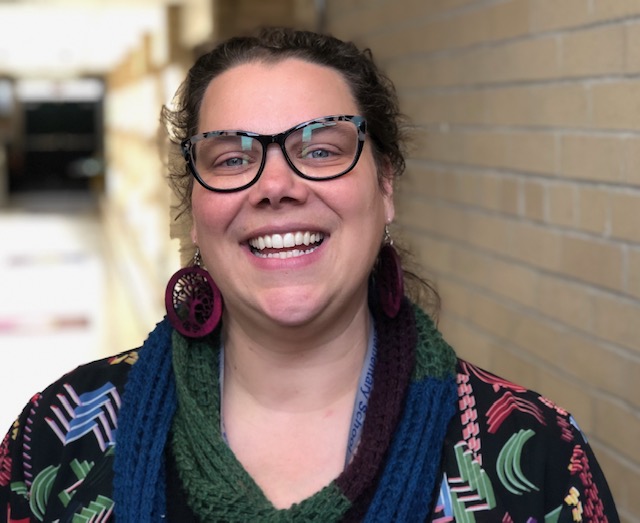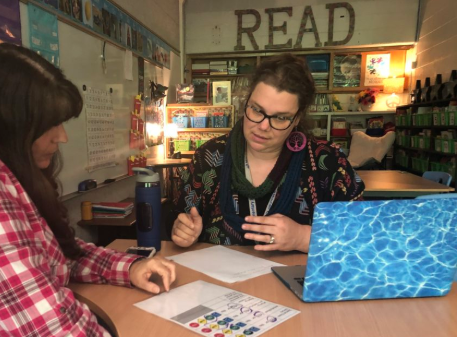
By Jo Mathis/AAPS District News Editor
Catherine (“Cat”) Hogans grew up in Flint, an only child. Her father, Ken, worked for Buick City until his death when she was 15. Her mom, Carol, was a reading teacher at the Urban League who later worked as a GED teacher for inmates at the Genessee County Jail.
After high school graduation in 1993, Hogans attended the University of Michigan. Initially a mathematics major, she came to the realization after spending a summer in London that she didn’t want a career sitting behind a desk, so she changed majors. After graduating in 1997 with a psychology degree, she moved to Detroit and eventually continued her education at Wayne State University, earning her master’s in social work.
This school year is Hogans’ 15th year as a school social worker and her sixth working for AAPS. She lives in Ypsilanti with her husband and two sons and enjoys impromptu dance parties, knitting projects for friends and family, cooking and sharing meals with her cookbook club/tribe aptly named ‘The Broken Forks,” and reading and playing games with her boys.
On weekends for additional income, she works for Shipt, doing grocery shopping and delivery. Last fall, Hogans also began collaborating with the Ann Arbor Community Center, partnering with families focused on family health and well-being.
What inspired you to become a social worker? To this day, I can’t quite pinpoint a person or an event that inspired me to go into social work. In fact, I still look back and think: What the heck were you thinking? But I also now recognize that this was my path all along.
When did you know you wanted to work with students? I have always felt more related to the spirit of joy and innocence of children, seeing through the fear and anxiety that grows as we grow older. I am intuitive and empathic to the stress of humans and as much as it impacts my resilience sometimes, I have seen the impact of my work with children and can’t imagine any other work.
What would surprise people about your job? Being a school social worker can be magical. Seeing a child make a connection, grow more confident, feel safe, feel successful, knowing that it took a village to make it happen.

What’s the best compliment anyone could give you? Just a couple of weeks ago, one of my current students told me that he wants to be a social worker at Mitchell when he grows up.
Describe an average workday. I arrive at 7:30 a.m. and review my to-do list for the day. I finish my documentation from the previous day and check in with my colleagues/friends. I complete any last-minute paperwork or follow up from the day before and my phone alarm goes off at 8:45 a.m. to greet students.
After that, I can’t really describe the rest of an average day. Every day is very different. I provide therapeutic intervention for students and groups of students. I facilitate social groups for students. I meet with parents and teachers for a variety of reasons with the ultimate goal of student safety, mental and behavioral health. I get text messages asking for my help in response to a student who is in crisis and may spend half a day or more supporting one individual student. I spend days in meetings with special education teams, parents and administrators. I coordinate supports with social work colleagues, community resources, and families….and the list goes on.
What’s the most challenging part of your job? There are many times I leave work thinking it’s too hard, thinking nothing changes or feeling like there are so many things working against our ability to make progress. When I am at my most stressed, I consider leaving for a higher paying profession without this ongoing stress. I have to really remember my self-care routines and pay attention to and make effort at times to stay focused on gratitude and the joy within each day.
What’s the happiest part of your day? At Mitchell, the happiest part of my day is seeing students smiling, laughing and learning. At home, the happiest part of my day is getting hugs and love from my family, making a meal that both of my boys like, and finding time to relax.
What question were you hoping you wouldn’t be asked? “What makes you an exceptional social worker?” And I appreciate not being asked.
Favorite websites: Netflix.
Apps you can’t live without: Gratitude, Fill-a-pix.
If you could know the definitive answer to any one question, what would that question be? I have been pondering this for days and cannot think of any one question. I am really content with the unknown and have faith in the divine flow of all things.
What was always written on your report card in grade school? Great question. Honestly, my memories of high school are very limited because I was dealing with the trauma of my dad’s death. I can imagine that my elementary and middle school report cards had comments related to me being a good student.
Did your father’s death when you were just 15 affect the way you relate with troubled students today? Everyone’s experience of trauma can manifest differently. I wouldn’t say the death of my father impacts my work generally, but when I do come across a student who lost their father early on, it definitely makes me step back and be aware of my feelings in relation to my work with that student and/or family.
I do give my mom extra kudos for what she had to deal with, losing her spouse while raising her child. I didn’t make it easy for her, working through my grief in my late teens/early twenties the goth way.
How goth did you get? Not sure how to respond to that one. You would have to ask my friends.
If you could talk to your teenage self, what would you say? Pick a profession where you can make enough money to live without financial stress while following your passion.
You seem to enjoy laughing and smiling. Is that hard to do some days? I’m sure you have heard the saying, “If you can’t laugh, you’ll cry.” I have said that many, many times over the course of my career. There are circumstances and situations that are so difficult at work that you have to really stay focused on the joy and laughter as much as you can.
How do you show school spirit? I always talk up Mitchell whenever schooling is the topic of conversation. I am on the social committee for Mitchell with a focus on building staff capacity and relationships.
What is the most rewarding part of your job? Now that I am into the second decade of my career, one of the most rewarding things is to see some of my students who are now completing high school and entering adulthood.
What do you wish everyone realized about the work of a school social worker? Certified school social workers are qualified to work within the parameters of special education and are typically paid through special education monies. Most schools do not have positions for social workers who work in general education, therefore the typical school social worker is trying to assist in all general education matters as well as fulfill the commitments of their special education caseload. This is an impossible task. We should be advocating more for general education social workers in all schools who have the training to evaluate systems and identify school-wide, classroom-wide and student-centered interventions to promote the social and emotional health of our communities.
How do you recharge? I would call myself an introverted extrovert. I really feel recharged when I am social but also get recharged from individual activities like meditation, massage, quietly knitting and listening to music or watching a funny show.
How do you spend your summers? We try to take at least one family adventure, exploring somewhere we have never been before. Two years ago, we drove through Pennsylvania and New York and visited family in Virginia. Last year, we found an Airbnb glamping site and explored Ohio.
What’s most exciting about your professional life right now? Your personal life? I recently started working with the Ann Arbor Community Center as a parent partner for their Family Mentorship program. I am working alongside a family to support short-term and long-term goals that they have such as owning a home and supporting their oldest with post-high school goals. In addition, Scarlett/Mitchell school psychologist Dr. Jameel Smith and I are writing and presenting professional development for our staff on trauma-informed teaching this school year.
Personally, not sure if I would describe it as most exciting, but I purchased a used elliptical machine over the holidays and am looking forward to getting back into a cardio routine for myself through the winter.

Be the first to comment